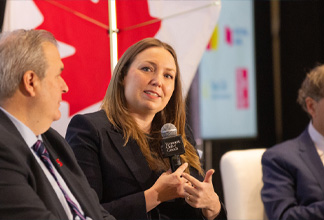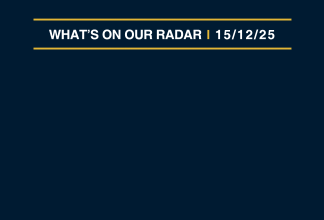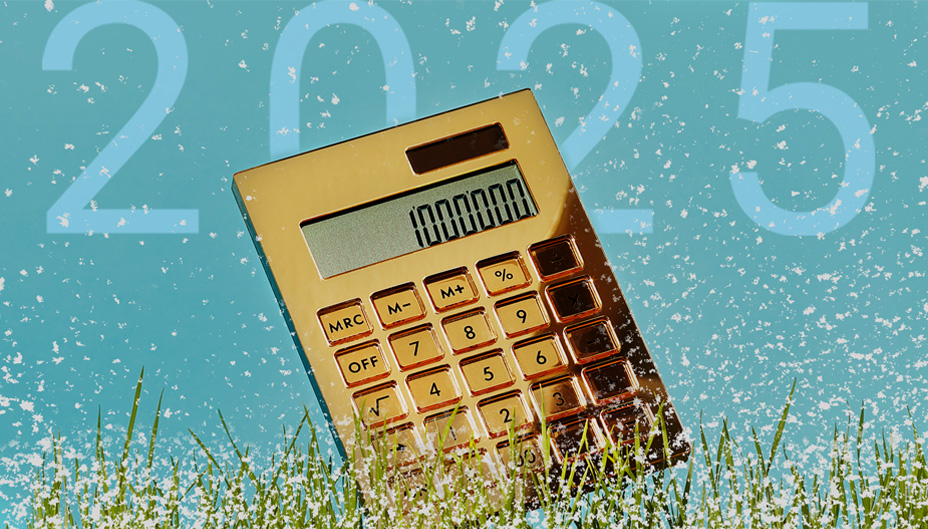5 Ways to Get Ahead in 2025
Written by The Inspired Investor Team
Published on January 16, 2025
minute read
Share:
At this time of year, everyone is making resolutions, but maybe you’re not sure where to begin with your financial goals. Well, you’re in luck: we’ve put together a few ideas for your portfolio for this year.
Maximizing your GST holiday
“Save the tax” is a familiar offer from retailers, but the federal government recently took the idea to a new level. From December 14, 2024, to February 15, 2025, the GST/HST is being waived on a number of essentials including groceries, books, children’s clothing and toys.
The government estimates that a family who spends $2,000 on eligible goods in the two-month period can save between $100 and $2601 (depending on the province and whether GST is harmonized with provincial sales tax). While having a little extra cash is nice, you could consider directing it into a registered account to get even more bang for your buck. Contributions to these accounts can help boost your investable assets and may reduce your taxable income or, in the case of a Registered Education Savings Plan (RESP), help your contribution earn the Canada Education Savings Grant.
Revisit your budget and pay down debt
If you feel a little cash-strapped at the beginning of the year, consider resetting your budget with a renewed purpose. Melissa Leong, author of Happy Go Money, suggests creating a plan for your money that sets ground rules for a fresh approach. “Identify your short-term and long-term goals (ones that take more than five years to achieve). Break them down into mini, bite-sized goals that you can tackle immediately,” writes Leong.
She suggests setting up an automatic withdrawal of funds so that money is transferred out of your account, maybe each payday, into a separate account. “Take care of your money priorities first, whether that’s creating financial freedom in retirement, supporting your children through post-secondary education or bulking up your emergency fund,” Leong writes. Also consider freeing up some cash by cancelling online subscriptions you don’t use, reducing electricity use or finding a cheaper cell phone plan.
You could also use any money you save from making these changes to pay down high-interest debt. Assuming your interest rate and income stay the same, reducing your outstanding high-interest debt balance will lower your interest payments going forward, and leave more money in your pocket to reduce your debt further.
Review your portfolio and asset allocation
Political uncertainty and market uncertainty often go hand in hand. With an election looming in Canada and a new administration in the U.S., consider reviewing your investment goals and risk tolerance levels in case markets get choppy. Think about rebalancing – which means ensuring the percentage of stocks versus bonds (and other investments) in your portfolio are where you want them to be – as well as whether your investments are diversified across sectors and geographies.
RBC Direct Investing’s Portfolio Analyzer tool can help. (From your online account, go to the Monitor tab, click Portfolio Goals from the drop-down menu and select Portfolio Analyzer.) This tool lets you easily view your overall mix of Canadian, U.S. and international stocks, fixed-income securities and cash to help assess your level of diversification. You can also see where your portfolio lands on the risk/return scale and how it fits your investor profile.
Maximizing your contributions
A new year is also an opportunity to maximize your contributions to registered accounts such as a Registered Retirement Savings Plan (RRSP), Tax-Free Savings Account (TFSA) or the relatively new First Home Savings Account (FHSA). Contribution amounts can change, so it’s a good idea to check the new limits. Here’s a quick refresher.
RRSP: An RRSP allows you to grow your investments tax-free until you withdraw them – ideally in retirement. Contributions made to an RRSP are tax-deductible. The RRSP contribution limit for 2025 is 18% of your earned income for 2024, or the annual limit set for 2025 of $32,490 (whichever is lower). The deadline to make an RRSP contribution eligible for a tax deduction for the previous year is 60 calendar days into the next year. For the 2024 tax year, the last day to make a contribution is March 3, 2025.
TFSA: A TFSA enables you to grow your investments tax-free, and unlike an RRSP, you don’t pay tax on the gains when money is withdrawn. (TFSA contributions aren’t tax deductible like with an RRSP, as a TFSA uses “after-tax” money). Unused contributions can be carried forward to future years. The contribution limit for 2025 is $7,000. If you turned 18 before the year 2009 and have never contributed, your maximum lifetime TFSA contribution limit is $102,000 as of January 1, 2025. Also, if you made any withdrawals from your TFSA in 2024 (not including withdrawals to correct an overcontribution), as of January 1, you can put those funds back into your account.
FHSA: The FHSA, launched in 2023, allows qualifying first-time homebuyers to save money for a down payment on their first home. Annual contributions are capped at $8,000, up to a lifetime contribution of $40,000. A maximum of $8,000 in unused contribution room can be carried forward to the following year. Annual contributions of up to $8,000 are tax-deductible, but unlike RRSPs, only contributions made within the calendar year (not within the first 60 days of the following calendar year) can be claimed as a deduction for that tax year. Like TFSA withdrawals, qualifying FHSA withdrawals are not taxed.
Build investor confidence with a practice account
If you’re new to investing or want to try a different strategy or trade a new investment in 2025, you can test the waters first with a practice account. A practice account can help you explore potential investment opportunities and build more confidence without the risk of real-life trading.
Interested in learning more about international investing, options trading or fixed-income securities? Check out RBC Direct Investing’s investing guides here.
Sources
1. Government of Canada, "Legislation to put more money in your pocket received Royal Assent", December 2024
RBC Direct Investing Inc. and Royal Bank of Canada are separate corporate entities which are affiliated. RBC Direct Investing Inc. is a wholly owned subsidiary of Royal Bank of Canada and is a Member of the Canadian Investment Regulatory Organization and the Canadian Investor Protection Fund. Royal Bank of Canada and certain of its issuers are related to RBC Direct Investing Inc. RBC Direct Investing Inc. does not provide investment advice or recommendations regarding the purchase or sale of any securities. Investors are responsible for their own investment decisions. RBC Direct Investing is a business name used by RBC Direct Investing Inc. ® / ™ Trademark(s) of Royal Bank of Canada. RBC and Royal Bank are registered trademarks of Royal Bank of Canada. Used under licence.
© Royal Bank of Canada 2025.
Any information, opinions or views provided in this document, including hyperlinks to the RBC Direct Investing Inc. website or the websites of its affiliates or third parties, are for your general information only, and are not intended to provide legal, investment, financial, accounting, tax or other professional advice. While information presented is believed to be factual and current, its accuracy is not guaranteed and it should not be regarded as a complete analysis of the subjects discussed. All expressions of opinion reflect the judgment of the author(s) as of the date of publication and are subject to change. No endorsement of any third parties or their advice, opinions, information, products or services is expressly given or implied by RBC Direct Investing Inc. or its affiliates. You should consult with your advisor before taking any action based upon the information contained in this document.
Furthermore, the products, services and securities referred to in this publication are only available in Canada and other jurisdictions where they may be legally offered for sale. Information available on the RBC Direct Investing website is intended for access by residents of Canada only, and should not be accessed from any jurisdiction outside Canada.
Explore More

7 Ways to Get Ahead Financially in 2026
How you might invigorate your finances and put your money to work more intentionally this year
minute read

Economic Outlook: Uncertainty is Here to Stay, So What's Next?
Takeaways from the Economic Club of Canada’s Annual Event
minute read

3 things: Week of December 15
What the Inspired Investor team is watching this week
minute read
Inspired Investor brings you personal stories, timely information and expert insights to empower your investment decisions. Visit About Us to find out more.







